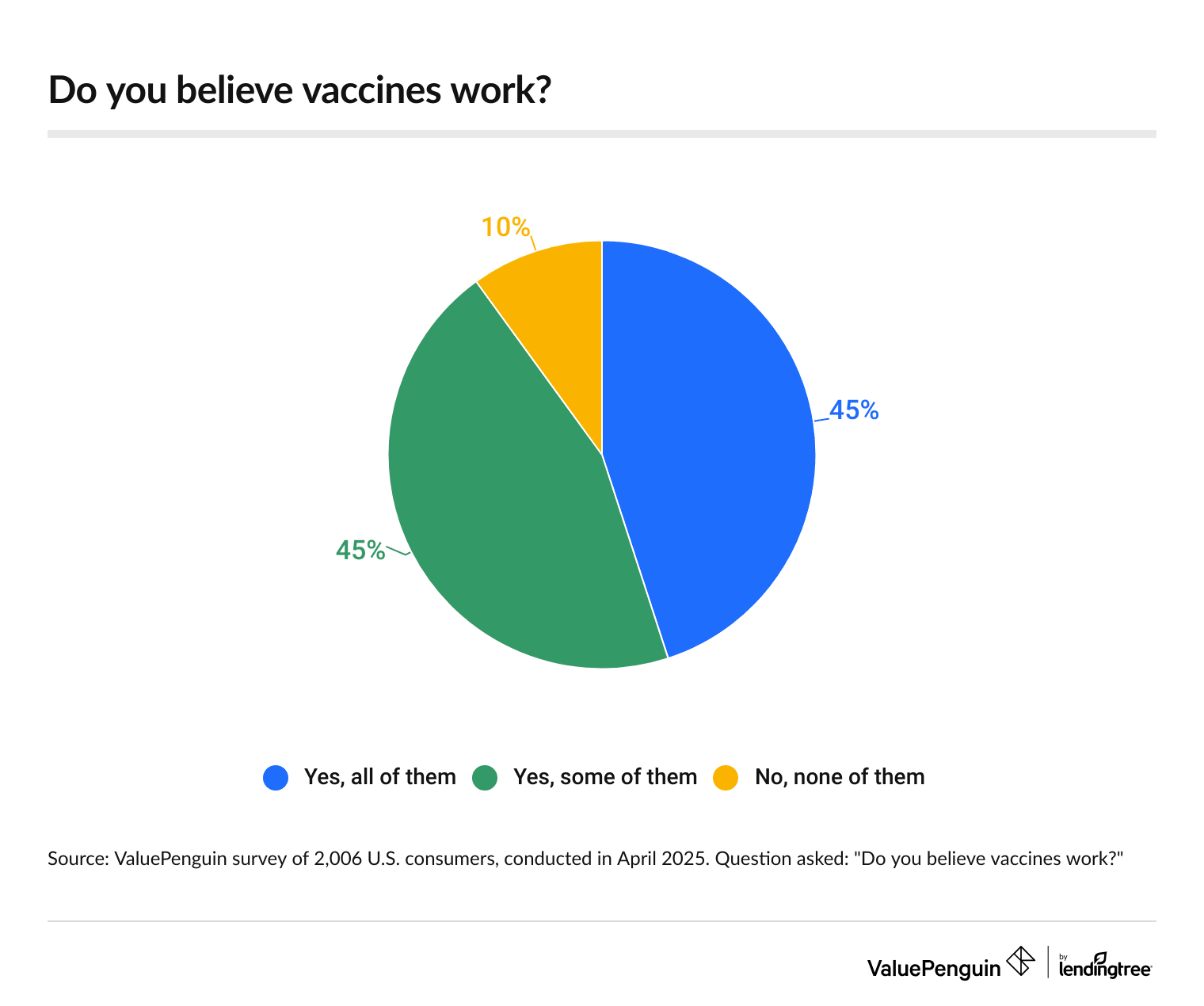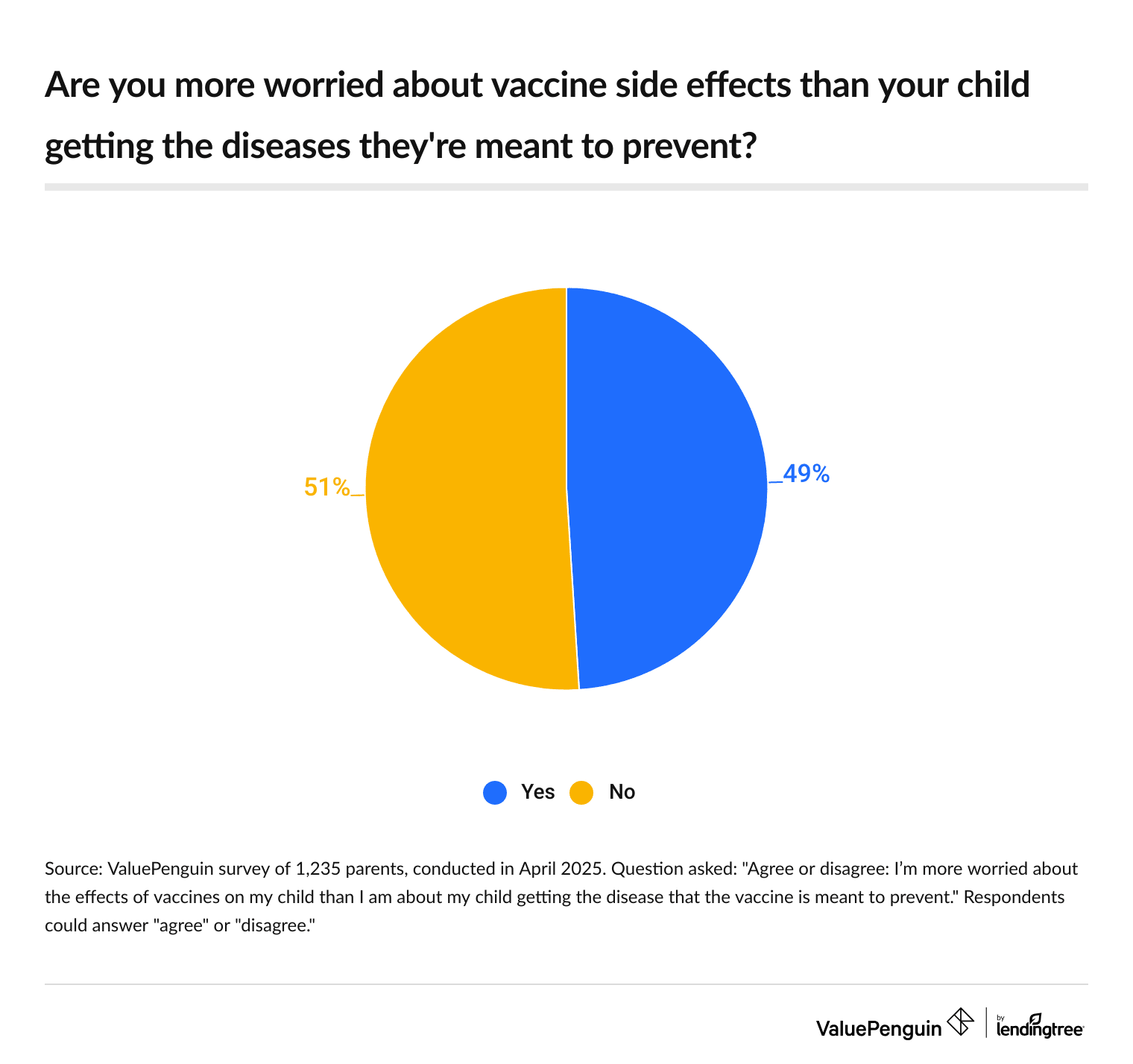Health Insurance
Amid Measles Outbreak and Autism Concerns, 30% of Americans Are Vaccine Skeptics

While vaccine skepticism has always existed on the fringes of society, the COVID-19 pandemic sparked a wave of widespread doubt. This shift was largely fueled by political polarization — and with U.S. Health Secretary Robert F. Kennedy Jr. in office, that polarization is widening.
According to a ValuePenguin survey of 2,000-plus U.S. consumers, 30% of Americans agree with RFK Jr.’s vaccine skepticism, with Republicans (50%) significantly more likely to say so than Democrats (16%).
Here’s what else we found.
On this page
Key findings
- Vaccine skeptics are overwhelmingly Republican, but a majority — regardless of political affiliation — think access may be at risk. 30% of Americans agree with RFK Jr.’s vaccine skepticism, though Republicans (50%) are significantly more likely to say so than Democrats (16%). Meanwhile, 41% of Americans think his skepticism will affect vaccine access.
- Americans don’t think vaccines are all or nothing. While 45% of Americans think all vaccines work, another 45% think only some work. That said, 78% say they’re up to date with at least most of their vaccines — even if 37% don’t get routine annual vaccinations such as those for the flu or COVID-19. Of those who don’t get routine annual vaccines, 61% say nothing could incentivize them to do so.
- The majority of parents vaccinate their children, but many worry more about vaccine side effects than the diseases they prevent. 93% of parents say their child receives at least some vaccines, but 49% are more worried about potential vaccine side effects than their child getting the diseases they’re meant to prevent. Across Americans, 29% believe that vaccines can cause autism, led by those with children under 18 (40%). With those concerns in mind, 26% think schools shouldn’t have vaccine requirements.
- Americans are split on how the federal government is handling the measles outbreak. 43% of Americans say the federal government isn’t doing a good job handling the current measles outbreak. Amid this current outbreak, 56% are concerned about the next pandemic or disease outbreak. And 69% of parents say a significant child illness in the family would cause financial hardship.
Republicans most likely to be vaccine skeptics
As RFK Jr. continues to share false statements surrounding vaccines (such as stating the measles, mumps and rubella, or MMR, vaccine causes deaths every year and suggesting childhood vaccines cause poor health or even autism), a significant 30% of Americans say they agree with his skepticism.
Amid a charged political climate, Republicans (50%) are significantly more likely to say so than Democrats (16%). A quarter (25%) of independents agree.
Although kids are most at risk of serious illness from diseases that vaccines prevent, those with children younger than 18 (41%) are much more likely to be vaccine skeptics than those without children (24%) and those with children older than 18 (24%).
By age group, millennials ages 29 to 44 are the most likely to agree with RFK Jr., at 37%. Additionally, men (37%) are more likely to agree with RFK Jr. than women (23%).
Regardless of their beliefs, 41% think this skepticism will affect vaccine access, with the highest rates among Democrats (57%) and six-figure earners (48%).
According to ValuePenguin health insurance expert Divya Sangameshwar, reduced access to vaccines can be damaging.
"This can lead to an increase in disease outbreaks, the reemergence of dangerous diseases from the past and higher mortality rates," she says. "It can also lead to higher health care costs and more financial strain on individuals and communities."
Most Americans up to date with at least most of their shots
While a significant portion of Americans are skeptical of vaccines, many don’t think they’re all or nothing. While 45% of Americans think all vaccines work, another 45% think only some work and just 10% believe none of them work.

That could boil down to distrust for relatively new technology like mRNA vaccines (the COVID-19 shot is the only authorized mRNA vaccine). It could also be related to the common misconception that a flu shot doesn’t work (though its effectiveness is largely determined by which strains are selected for the vaccinations each flu season).
Still, 78% of Americans say they’re up to date with at least most of their vaccines, led by Democrats at 86%. By age group, baby boomers ages 61 to 79 (84%) are the most likely to say similarly. That’s followed by:
- Gen Xers ages 45 to 60 (80%)
- Millennials (75%)
- Gen Zers ages 18 to 28 (70%)
Meanwhile, 37% of Americans don’t get routine annual vaccinations such as those for the flu or COVID-19. That percentage is higher among those earning less than $30,000 (52%) and independents (46%). Of those who don’t get routine annual vaccines, 61% say nothing could incentivize them to do so — though monetary benefits would incentivize 15%.
Of those who get routine annual vaccinations, 86% say their health insurance covers the costs.
Sangameshwar warns that skipping routine vaccines isn’t a good idea.
"Not getting your yearly shots like the flu and COVID-19 vaccines has consequences," she says. "Skipping them could lead to infection, more severe illness and complications (such as pneumonia), and transmission to others who may be vulnerable — including infants, the elderly and the immunocompromised."
Parents worry about vaccine side effects
While vaccine skepticism is rampant, most parents aren’t acting on it. Among parents, 93% say their child receives at least the required vaccines. However, almost half (49%) of parents are more worried about potential vaccine side effects than their child getting the diseases that vaccines are meant to prevent.

Despite overwhelming evidence to the contrary, 29% of Americans believe vaccines can cause autism. The percentage is higher among those with children under 18 (40%), Republicans (39%) and millennials (37%). Notably, over a quarter (26%) think schools shouldn’t have vaccine requirements, led by Gen Zers (41%).
Among adults without children, 20% say they wouldn’t vaccinate their kids if they had them. Those earning less than $30,000 (28%), Gen Zers (27%) and millennials (24%) are particularly likely to hold this belief.
Most Americans were vaccinated as kids, but some regret it
As skepticism becomes more common, some regret being vaccinated as kids. While the majority (91%) of Americans were vaccinated as children, 16% who were vaccinated say they have regrets.
Notably, 22% of Gen Zers say they didn’t get vaccinated as a child — making them the least likely to have received childhood vaccinations. Those earning less than $30,000 (16%) follow.
When it comes to those who regret being vaccinated as kids, Gen Zers (28%), those with children younger than 18 (27%) and millennials (25%) are the most likely to say so.
Americans aren’t confident in measles outbreak handling
As the measles outbreak continues to spread and RFK Jr. continues to send mixed messages surrounding the MMR vaccine, Americans are split on how the federal government is handling the outbreak.
Overall, 43% of Americans say the federal government isn’t doing a good job, while 30% are unsure and 27% think the government is handling it well.
Republicans (42%), those with children younger than 18 (38%) and six-figure earners (36%) are particularly likely to approve of the government’s handling of the measles outbreak. Notably, 35% of millennials say similarly — the highest by generation. Men (35%) are much more likely to approve than women (19%).
Still, 56% of Americans are concerned about the next pandemic or disease outbreak. Meanwhile, 69% of parents say a significant child illness in the family would cause financial hardship.
Getting vaxxed amid government skepticism: Top expert tips
While vaccines are in the spotlight, Sangameshwar says consumers shouldn’t be too concerned about access.
"Vaccines will still be available for those who want them," she says. "While more Americans are opting not to vaccinate, Americans who want to vaccinate can and should continue to vaccinate themselves and their children."
When it comes to utilizing your health insurance to keep you and your kids up to date, we recommend the following advice:
- Know what’s covered. Most health insurance plans cover routine vaccinations at no cost, but it’s important to check your plan’s benefits summary or call your provider so you’re not caught off guard by unexpected bills. Vaccines, like those for MMR, the flu and COVID-19, are often fully covered for children and adults.
- Use in-network providers. Even if a vaccine is covered, getting it from an out-of-network clinic could mean paying more. Stick with in-network doctors, clinics or pharmacies to avoid unnecessary costs. Some pharmacies even offer evening and weekend hours if you struggle to fit it into your schedule.
- Take advantage of child wellness visits. Annual checkups are a great time to get your kids caught up on recommended vaccines. Bring your child’s vaccination record and ask the doctor what they’re due for. Staying proactive helps you avoid last-minute scrambles before school or travel.
Methodology
ValuePenguin commissioned QuestionPro to conduct an online survey of 2,006 U.S. consumers ages 18 to 79 from April 8 to 14, 2025. The survey was administered using a nonprobability-based sample, and quotas were used to ensure the sample base represented the overall population. Researchers reviewed all responses for quality control.
We defined generations as the following ages in 2025:
- Generation Z: 18 to 28
- Millennial: 29 to 44
- Generation X: 45 to 60
- Baby boomer: 61 to 79
